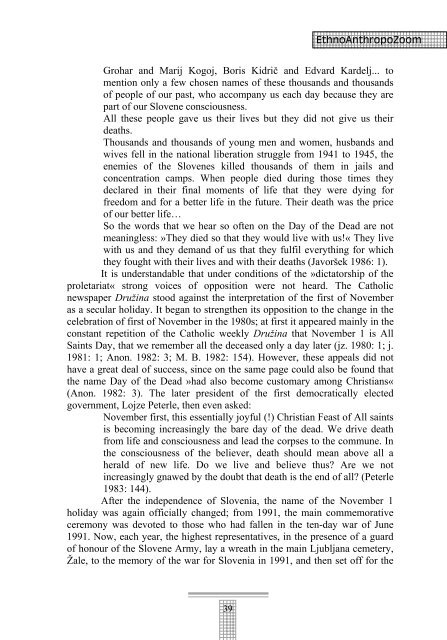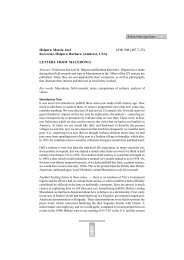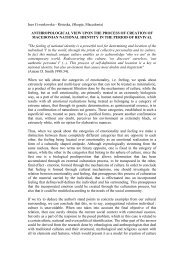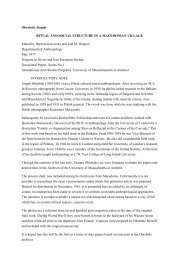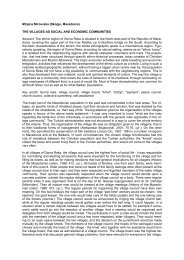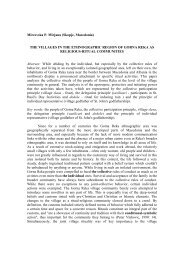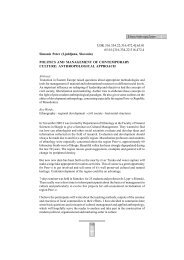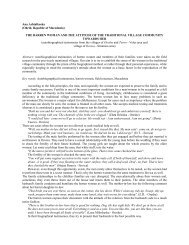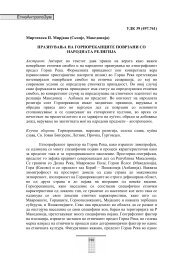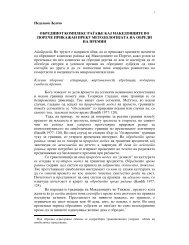Jezernik, Bozidar (Slovenia), The Red and the Black
Jezernik, Bozidar (Slovenia), The Red and the Black
Jezernik, Bozidar (Slovenia), The Red and the Black
You also want an ePaper? Increase the reach of your titles
YUMPU automatically turns print PDFs into web optimized ePapers that Google loves.
EthnoAnthropoZoom<br />
Grohar <strong>and</strong> Marij Kogoj, Boris Kidrič <strong>and</strong> Edvard Kardelj... to<br />
mention only a few chosen names of <strong>the</strong>se thous<strong>and</strong>s <strong>and</strong> thous<strong>and</strong>s<br />
of people of our past, who accompany us each day because <strong>the</strong>y are<br />
part of our Slovene consciousness.<br />
All <strong>the</strong>se people gave us <strong>the</strong>ir lives but <strong>the</strong>y did not give us <strong>the</strong>ir<br />
deaths.<br />
Thous<strong>and</strong>s <strong>and</strong> thous<strong>and</strong>s of young men <strong>and</strong> women, husb<strong>and</strong>s <strong>and</strong><br />
wives fell in <strong>the</strong> national liberation struggle from 1941 to 1945, <strong>the</strong><br />
enemies of <strong>the</strong> Slovenes killed thous<strong>and</strong>s of <strong>the</strong>m in jails <strong>and</strong><br />
concentration camps. When people died during those times <strong>the</strong>y<br />
declared in <strong>the</strong>ir final moments of life that <strong>the</strong>y were dying for<br />
freedom <strong>and</strong> for a better life in <strong>the</strong> future. <strong>The</strong>ir death was <strong>the</strong> price<br />
of our better life…<br />
So <strong>the</strong> words that we hear so often on <strong>the</strong> Day of <strong>the</strong> Dead are not<br />
meaningless: »<strong>The</strong>y died so that <strong>the</strong>y would live with us!« <strong>The</strong>y live<br />
with us <strong>and</strong> <strong>the</strong>y dem<strong>and</strong> of us that <strong>the</strong>y fulfil everything for which<br />
<strong>the</strong>y fought with <strong>the</strong>ir lives <strong>and</strong> with <strong>the</strong>ir deaths (Javoršek 1986: 1).<br />
It is underst<strong>and</strong>able that under conditions of <strong>the</strong> »dictatorship of <strong>the</strong><br />
proletariat« strong voices of opposition were not heard. <strong>The</strong> Catholic<br />
newspaper Družina stood against <strong>the</strong> interpretation of <strong>the</strong> first of November<br />
as a secular holiday. It began to streng<strong>the</strong>n its opposition to <strong>the</strong> change in <strong>the</strong><br />
celebration of first of November in <strong>the</strong> 1980s; at first it appeared mainly in <strong>the</strong><br />
constant repetition of <strong>the</strong> Catholic weekly Družina that November 1 is All<br />
Saints Day, that we remember all <strong>the</strong> deceased only a day later (jz. 1980: 1; j.<br />
1981: 1; Anon. 1982: 3; M. B. 1982: 154). However, <strong>the</strong>se appeals did not<br />
have a great deal of success, since on <strong>the</strong> same page could also be found that<br />
<strong>the</strong> name Day of <strong>the</strong> Dead »had also become customary among Christians«<br />
(Anon. 1982: 3). <strong>The</strong> later president of <strong>the</strong> first democratically elected<br />
government, Lojze Peterle, <strong>the</strong>n even asked:<br />
November first, this essentially joyful (!) Christian Feast of All saints<br />
is becoming increasingly <strong>the</strong> bare day of <strong>the</strong> dead. We drive death<br />
from life <strong>and</strong> consciousness <strong>and</strong> lead <strong>the</strong> corpses to <strong>the</strong> commune. In<br />
<strong>the</strong> consciousness of <strong>the</strong> believer, death should mean above all a<br />
herald of new life. Do we live <strong>and</strong> believe thus? Are we not<br />
increasingly gnawed by <strong>the</strong> doubt that death is <strong>the</strong> end of all? (Peterle<br />
1983: 144).<br />
After <strong>the</strong> independence of <strong>Slovenia</strong>, <strong>the</strong> name of <strong>the</strong> November 1<br />
holiday was again officially changed; from 1991, <strong>the</strong> main commemorative<br />
ceremony was devoted to those who had fallen in <strong>the</strong> ten-day war of June<br />
1991. Now, each year, <strong>the</strong> highest representatives, in <strong>the</strong> presence of a guard<br />
of honour of <strong>the</strong> Slovene Army, lay a wreath in <strong>the</strong> main Ljubljana cemetery,<br />
Žale, to <strong>the</strong> memory of <strong>the</strong> war for <strong>Slovenia</strong> in 1991, <strong>and</strong> <strong>the</strong>n set off for <strong>the</strong><br />
39


